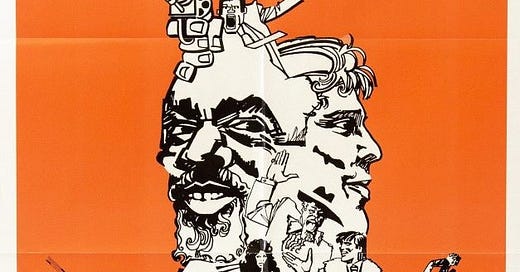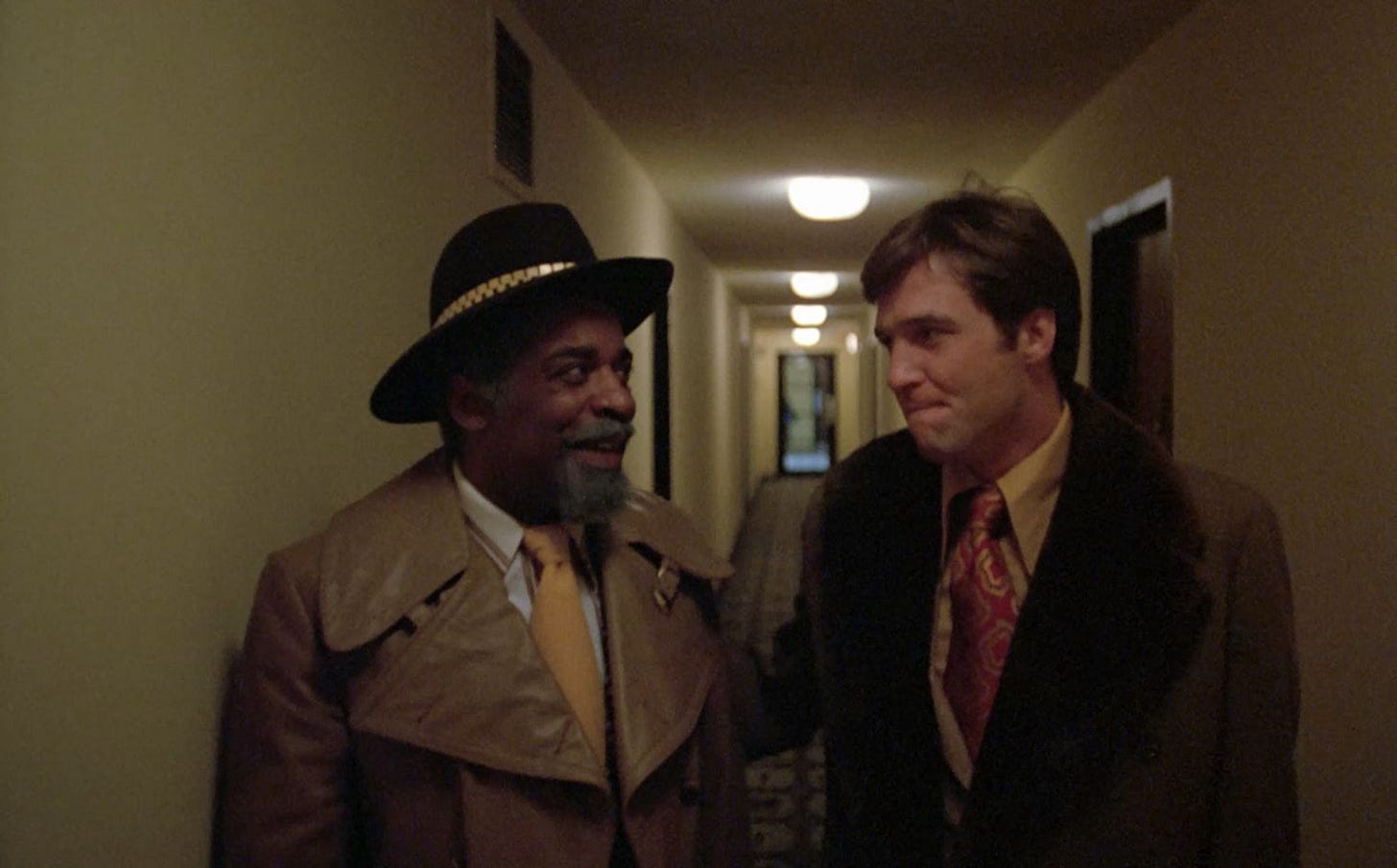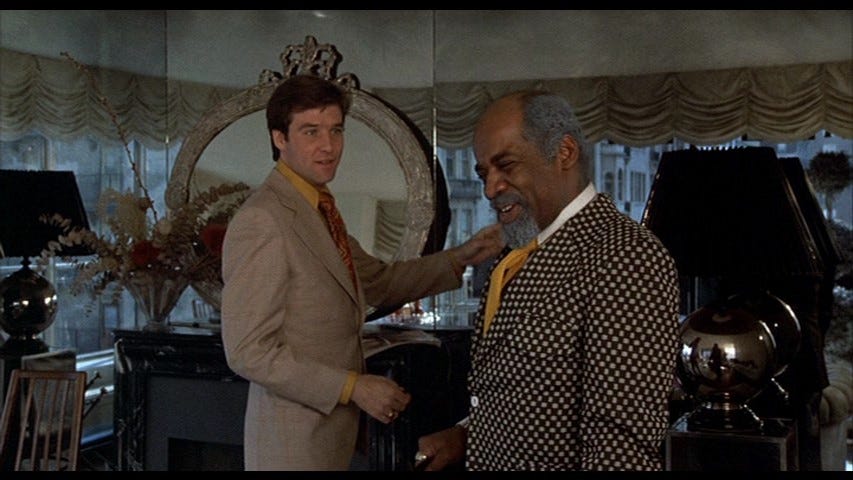Blaxploitation Education: Trick Baby
Iceberg Slim and Blaxploitation go together like chocolate and peanut butter.
I was just about ready to move on to 1973, but I found one last movie from 1972 to cover:
Trick Baby
Written by A. Neuberg, T. Raewyn, and Larry Yust
Directed by Larry Yust
1972
Since Blaxploitation movies often focused on urban crime, the works of Iceberg Slim are a perfect fit for the types of stories they told. Slim was a former pimp who wrote a well-received autobiography about his experiences, as well as several novels. His work has been cited as an influence by numerous Black entertainers, including Ice-T, Snoop Dogg, and Killer Mike. He was known for his ability to provide an authentic view of street life without overly romanticizing the criminals he depicted. That’s exactly what some of the best Blaxploitation movies delivered.
Trick Baby is an adaptation of Iceberg Slim’s first novel. It’s an independent production featuring a cast of unknowns, but it’s a solid crime movie that drops viewers into a story featuring small-time con men who seem to find some success but can’t escape the consequences of a life of crime. It’s got some great dialogue and a compelling depiction of the ways these hustlers can work their marks, while also featuring some great tension as they scramble to overcome the odds, even as they hurtle inevitably toward violence and death.
The story begins when a couple of white guys, one younger and one older, visit a Black man in a seedy hotel in Philadelphia. The younger guy bullies the man into showing them some jewelry he had apparently stolen, and then he offers to have the older man pay him $10,000. The Black guy protests, saying the jewelry is worth $100,000, but the young guy threatens him and says he’s lucky they’re not just taking the jewels and leaving him with nothing. He leaves him with the quip of “There’s no reason why colored and white can’t treat each other fair,” and then he and the older guy go their separate ways.
However, we then see the younger guy and the Black man meet up and celebrate. They were actually working together to swindle the older guy and sell him some worthless jewels. We learn that the Black man (played by Mel Stewart, who was the boxing trainer in Hammer) is named Blue, and he’s an experienced con man who has been teaching the younger guy the ropes. That guy is Johnny (Kiel Martin), although he’s usually called “White Folks,” since he’s actually half-Black. While Blue refers to him as Folks most of the time, other characters call him Trick Baby, a derisive nickname referring to his mother’s supposed profession.
The aftermath of this scheme kicks off a series of incidents that leave Blue and Folks scrambling to survive while also potentially pulling off a much bigger job. It turns out that their mark was the uncle of a local mob boss, and when the guy has a heart attack in response to the situation, the gangsters are out to find the people who were responsible. They recruit a dirty Black police officer named Dot (Dallas Edward Hayes, who was also in Across 110th Street), who figures out pretty quickly who pulled off the scheme. He comes to Blue and Folks and demands $5,000 for his silence, but they figure out a way to trick him out of the money, with plans to head out of town as soon as they can.
However, before they can do so, Folks stumbles into an even better scheme when he helps out a white lady named Susan (Beverly Ballard) who can’t seem to hail a cab. He convinces her that he’s a rich guy by throwing around some of the money he just made, and she takes him to a dinner party to meet some well-off white people. As these rich assholes casually discuss their superiority over Black people (ignoring the Black servants who are serving them), Folks is all too ready to cheat them out of whatever he can, so he casually mentions a lucrative real estate deal he’s involved in, claiming that he’s going to buy some property in the ghetto for $100,000 and then turn around and sell it for $500,000 as part of a gentrification scheme. They’re all too eager to get in on this deal, so he’s got them on the hook.
This provides some tension as he and Blue work together to complete this scheme while still dodging Dot and the mafia, hoping they can get the money they need and get out of town. Of course, it doesn’t work out that way, and there are plenty of twists and turns as they scramble to avoid the different threats. Soon enough, they’re just trying to get out of this situation alive, and things get worse and worse, eventually ending tragically, as so many of these stories do.
The movie does a great job of focusing on one small aspect of the criminal underworld while building out a realistic-seeming setting, populating the Philadelphia ghetto with interesting, believable characters. There’s plenty of great dialogue that is likely taken straight from the source material, including a scene in which a guy known as Felix the Fixer (Thomas Anderson, who was also in Shaft’s Big Score! and Don’t Play Us Cheap) approaches Blue and Folks in a bar and demands his cut of their recent score. He gives a short monologue about how he deserves a piece of all the schemes that take place in town because he’s the guy who can help deal with legal troubles by greasing the wheels of the justice system. He says, “Guaranteed to keep you out of the joint as long as I’m doin’ the fixin’, but when you make a score, and I don’t get my end, I’ll hear about it. I won’t tip you up wise, but when you come up on a solid beef, I’ll whisper in the judge’s ear, and the Supreme Court can’t keep you out of the penitentiary.” The movie is full of memorable lines like that, with the ways the characters talk and the confidence they have as they move through their setting giving everything an authentic feel.
The character of Folks is one of the most interesting parts of the movie, since he grew up in this community but is still treated like an outsider. He’s never really accepted by anyone except Blue, even though he knows just as well as anyone how to navigate the criminal underworld. He’s also able to fit in to white society, seeming just like the other upper-class pricks, but his disdain for them is clear, informing his desire to con them for as much money as possible. There’s an interesting bit where he’s trying to seduce Susan, and when she says she’s glad he helped her because she was scared of the Black people in the city, he responds by burning the cork on the champagne bottle they just opened and smearing it on his face, darkening his skin and telling her that she has nothing to be afraid of. It’s a sort of conflation of the two halves of his identity, as if he’s trying to demonstrate that there’s nothing wrong with his mixed-race nature. But at the same time, he seems to be happy to secretly be a Black man who is screwing this white woman as she’s unaware that he’s one of the people she’s so afraid of. That’s pretty interesting and complex, and while I imagine the novel delves even deeper into this aspect of the story, the filmmakers managed to get enough of it onscreen to make it pretty thought-provoking.
As a whole, the movie is a really solid crime thriller. It does get a little bit messy near the end, with a few things happening that are hard to follow. There’s a bit where Blue and Folks con a random guy they pass on the street, but what exactly they do isn’t really explained, and the scene is mostly there so they can both panic when he pulls a gun and threatens to kill Folks. It seems to be an illustration of the ways they are getting sloppy in their desperation after their schemes have begun to fall apart. The timeline also gets a bit hard to follow, with some uncertainty about why they remain in town and keep going to places where they are likely to be found by the people looking for them. The movie has to get to its expected tragic end, but it struggles a bit as it forces the characters into the necessary positions.
But even with some weaknesses, the movie as a whole is a great example of the cool crime stories that Blaxploitation often did so well. It’s got compelling characters moving through a setting that seems believable, and it builds drama from seeing people we like taking actions that are smart enough to potentially succeed but carry serious risks. When things inevitably fall apart, we feel the tragedy of the situation, the lost potential of people who had few options in their lives and who couldn’t escape the societal forces that have kept them scrabbling to survive. That’s the stuff of great crime drama.
Blaxploitation Education index:
UpTight
Cotton Comes to Harlem
Watermelon Man
The Big Doll House
Shaft
Sweet Sweetback’s Baadasssss Song
Super Fly
Buck and the Preacher
Blacula
Cool Breeze
Melinda
Slaughter
Hammer
Trouble Man
Hit Man
Black Gunn
Bone
Top of the Heap
Across 110th Street
The Legend of N***** Charley
Don’t Play Us Cheap
Shaft’s Big Score!
Non-Blaxploitation: Sounder and Lady Sings the Blues







I've long felt this would make for a fun double feature with The Sting.